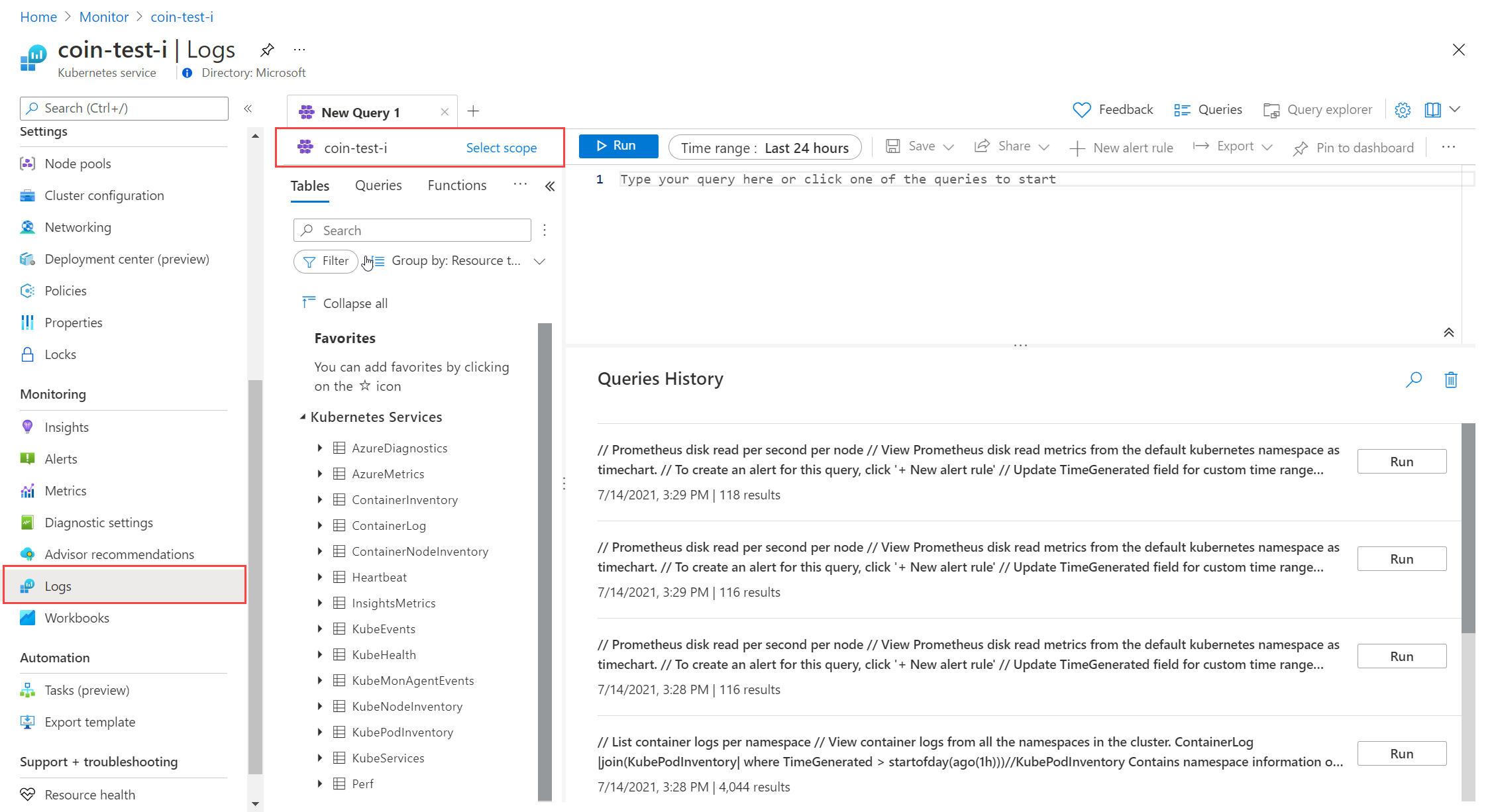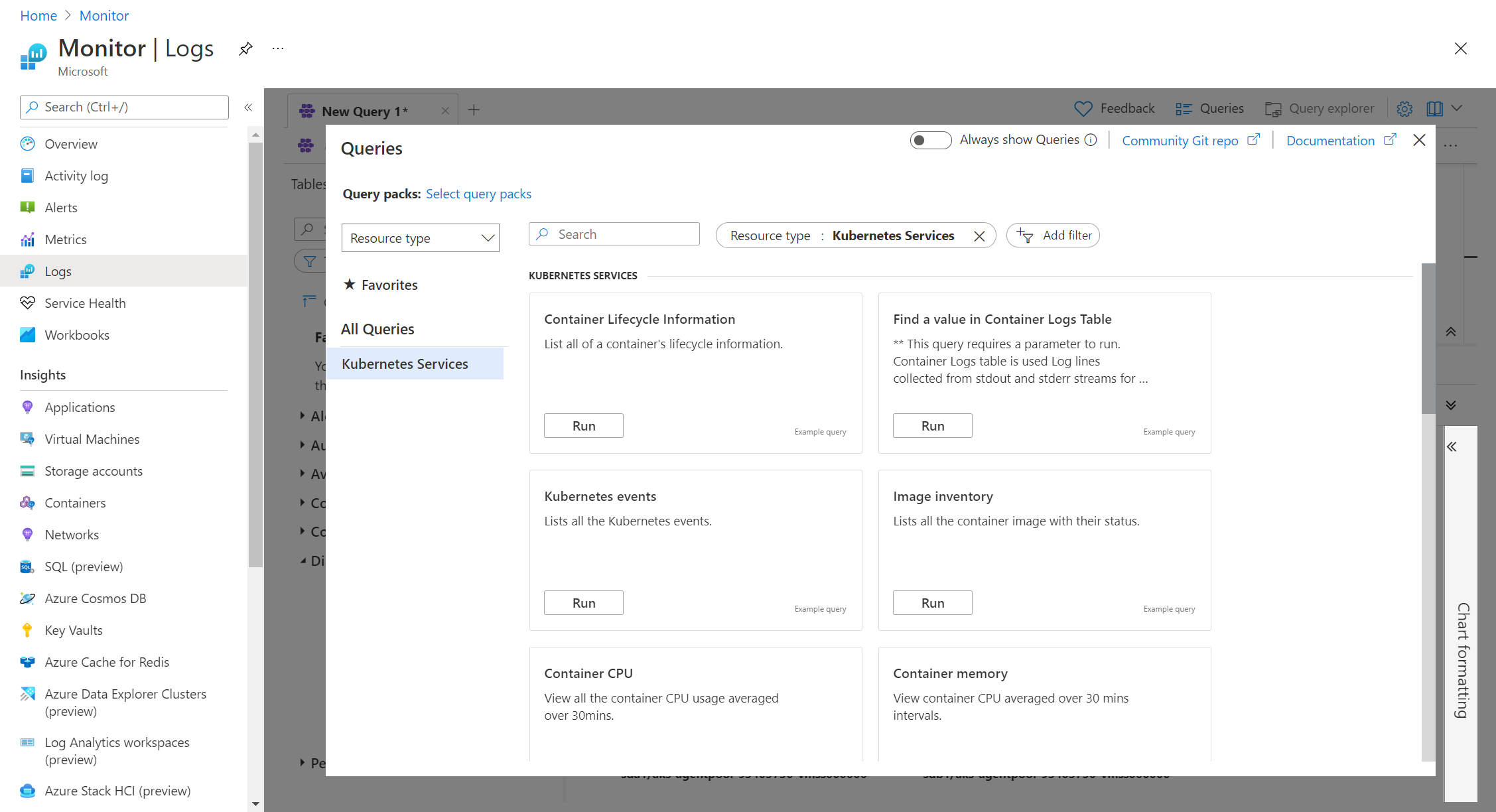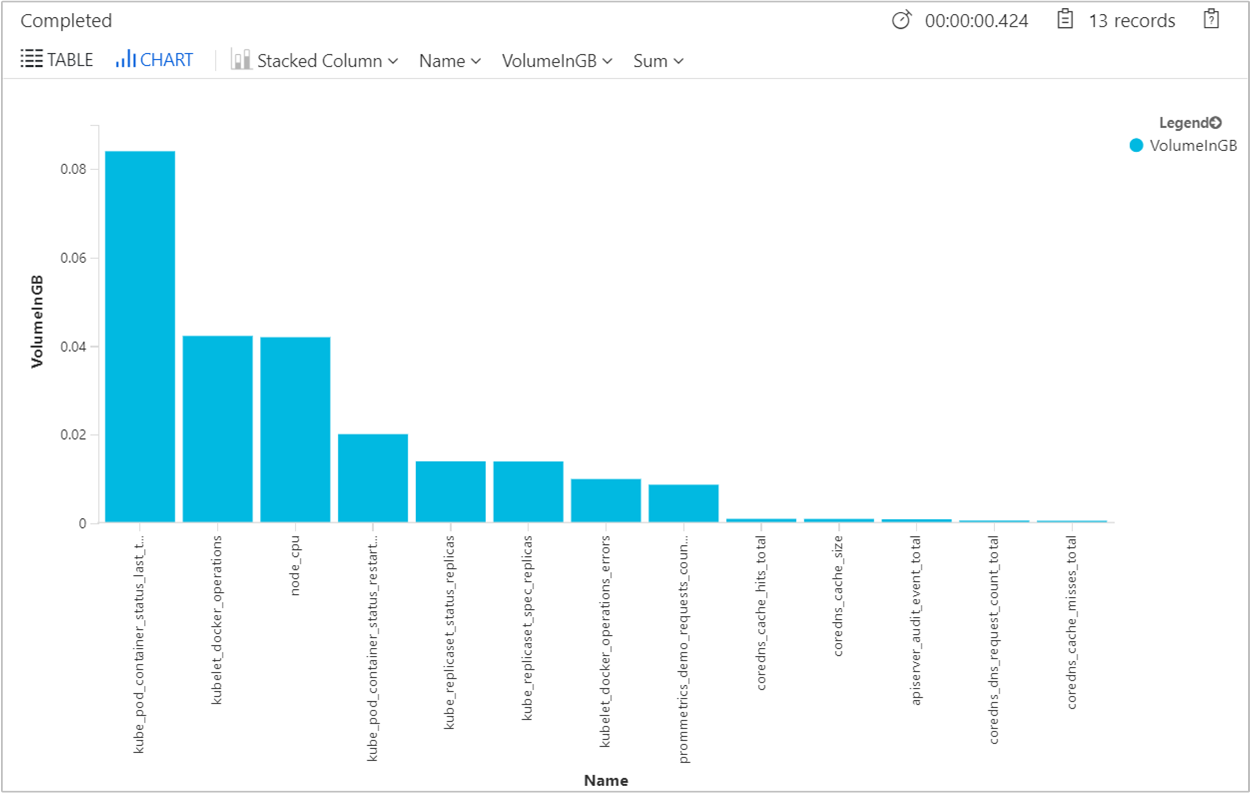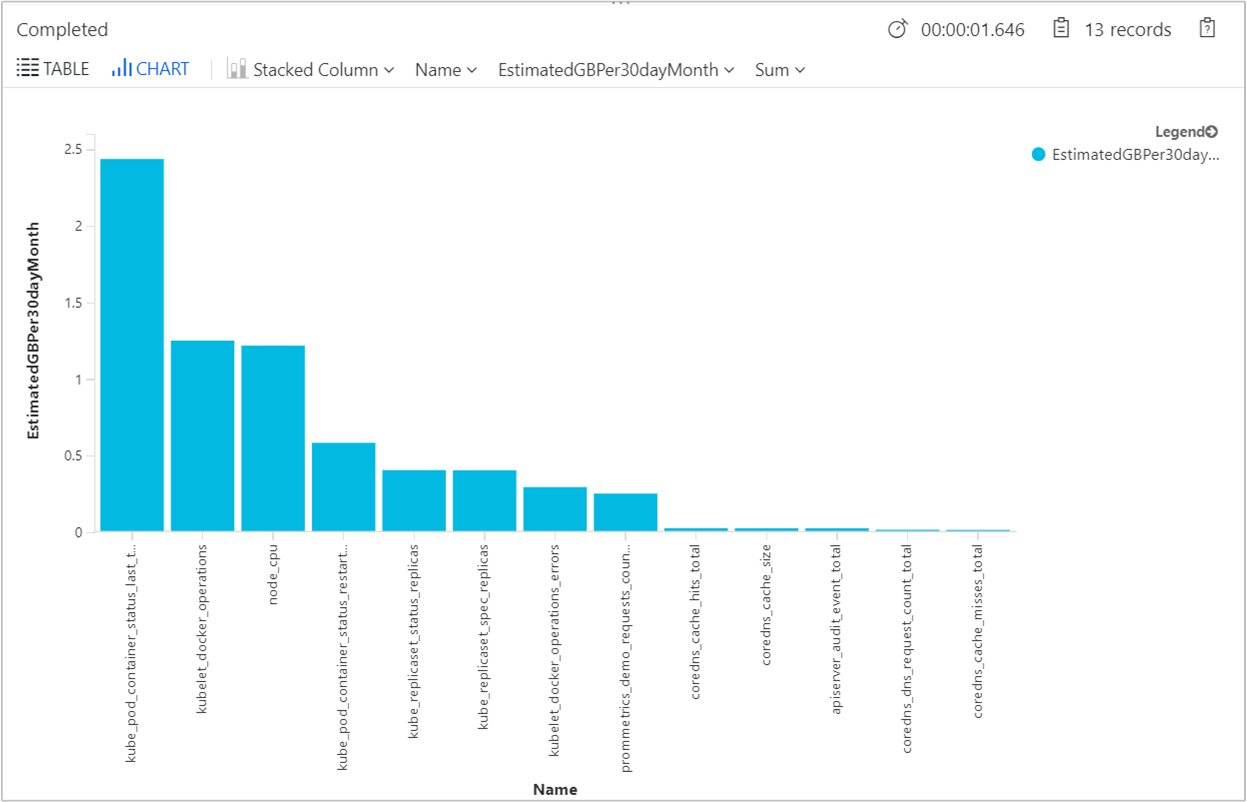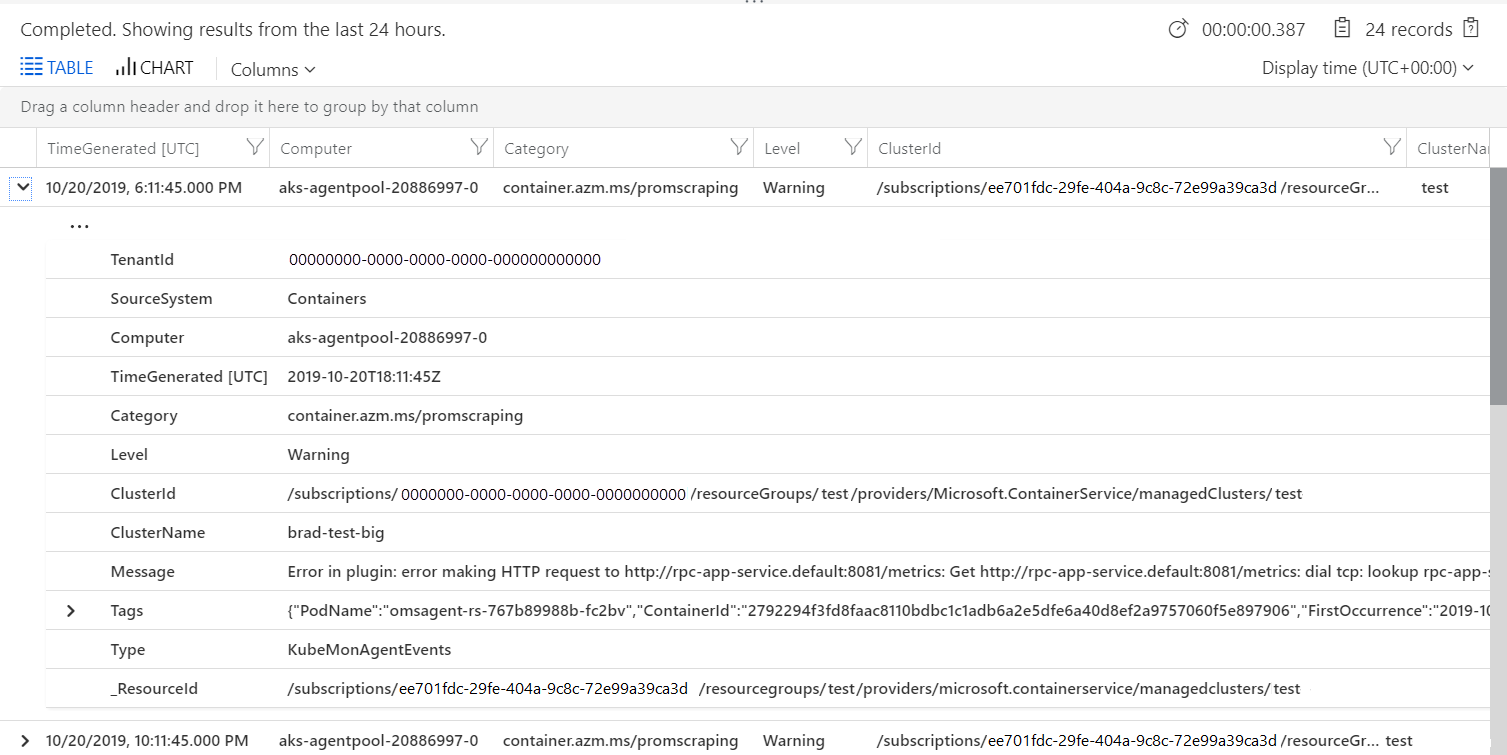ملاحظة
يتطلب الوصول إلى هذه الصفحة تخويلاً. يمكنك محاولة تسجيل الدخول أو تغيير الدلائل.
يتطلب الوصول إلى هذه الصفحة تخويلاً. يمكنك محاولة تغيير الدلائل.
تجمع نتائج تحليلات الحاوية مقاييس الأداء وبيانات المخزون ومعلومات الحالة الصحية من مضيفي الحاوية والحاويات. يتم جمع البيانات كل ثلاث دقائق وإعادة توجيهها إلى مساحة عمل تحليلات السجل في Azure Monitor حيث تكون متاحة لاستعلامات السجل باستخدام تحليلات السجل في Azure Monitor.
يمكنك تطبيق هذه البيانات على السيناريوهات التي تتضمن التخطيط للترحيل، وتحليل السعة، والاكتشاف، واستكشاف أخطاء الأداء، وإصلاحها عند الطلب. يمكن أن تساعدك Azure Monitor Logs في البحث عن الاتجاهات أو تشخيص الاختناقات أو التنبؤ أو ربط البيانات التي يمكن أن تساعدك في تحديد ما إذا كان تكوين الكتلة الحالي يعمل على النحو الأمثل.
للحصول على معلومات حول كيفية استخدام هذه الاستعلامات، راجع استخدام الاستعلامات في Log Analytics لـ Azure Monitor. للحصول على برنامج تعليمي كامل حول كيفية استخدام Log Analytics لتشغيل الاستعلامات والعمل باستخدام نتائجها، راجع البرنامج التعليمي لـ Log Analytics.
هام
تعتمد الاستعلامات في هذه المقالة على البيانات التي تم جمعها بواسطة نتائج تحليلات الحاوية وتخزينها في مساحة عمل Log Analytics. إذا قمت بتعديل إعدادات جمع البيانات الافتراضية، فقد لا ترجع الاستعلامات النتائج المتوقعة. على وجه الخصوص، إذا قمت بتعطيل جمع بيانات الأداء منذ تمكين مقاييس Prometheus لنظام المجموعة، فلن ترجع أي استعلامات تستخدم Perf الجدول النتائج.
راجع تكوين جمع البيانات في نتائج تحليلات الحاوية باستخدام قاعدة جمع البيانات للتكوينات المعينة مسبقا بما في ذلك تعطيل جمع بيانات الأداء. راجع تكوين جمع البيانات في نتائج تحليلات الحاوية باستخدام ConfigMap لمزيد من خيارات جمع البيانات.
تحليلات السجل
هناك عدة خيارات لبدء Log Analytics. يبدأ كل خيار مع نطاق مختلف. للوصول إلى جميع البيانات في مساحة العمل، في قائمة المراقبة، حدد السجلات. لتحديد البيانات إلى نظام مجموعة Kubernetes واحد حدد Logs من القائمة الكتلة.
استعلامات السجل الحالية
لا تحتاج بالضرورة إلى فهم كيفية كتابة استعلام سجل لاستخدام تحليلات السجل. يمكنك التحديد من بين استعلامات متعددة تم إنشاؤها مسبقًا. يمكنك إما تشغيل الاستعلامات بدون تعديل أو استخدامها كبداية لاستعلام مخصص. حدد الاستعلامات في أعلى شاشة Log Analytics واعرض الاستعلامات باستخدام نوع المورد لـKubernetes Services.
جداول الحاوية
للحصول على قائمة بالجداول والأوصاف التفصيلية الخاصة بها التي تستخدمها نتيجة تحليلات الحاوية، راجع مرجع جدول Azure Monitor. تتوفر جميع هذه الجداول لاستعلامات السجل.
مثال على استعلامات السجل
غالبًا ما يكون من المفيد إنشاء استعلامات تبدأ بمثال أو مثالَين ثم تعديلها لتلائم متطلباتك. للمساعدة في إنشاء استعلامات أكثر تقدمًا، يمكنك تجربة نماذج الاستعلامات التالية.
قائمة بجميع معلومات دورة حياة الحاوية
ContainerInventory
| project Computer, Name, Image, ImageTag, ContainerState, CreatedTime, StartedTime, FinishedTime
| render table
أحداث Kubernetes
إشعار
بشكل افتراضي، لا يتم تجميع أنواع الأحداث العادية، لذلك لن تراها عند الاستعلام عن جدول KubeEvents ما لم يتم تمكين إعداد collect_all_kube_events ConfigMap. إذا كنت بحاجة إلى جمع الأحداث العادية، فقم بتمكين إعداد collect_all_kube_events في container-azm-ms-agentconfig ConfigMap. راجع تكوين جمع بيانات العامل ل Container insights للحصول على معلومات حول كيفية تكوين ConfigMap.
KubeEvents
| where not(isempty(Namespace))
| sort by TimeGenerated desc
| render table
وحدة المعالجة المركزية «CPU» للحاوية
Perf
| where ObjectName == "K8SContainer" and CounterName == "cpuUsageNanoCores"
| summarize AvgCPUUsageNanoCores = avg(CounterValue) by bin(TimeGenerated, 30m), InstanceName
ذاكرة الحاوية
يستخدم memoryRssBytes هذا الاستعلام الذي يتوفر فقط لعقد Linux.
Perf
| where ObjectName == "K8SContainer" and CounterName == "memoryRssBytes"
| summarize AvgUsedRssMemoryBytes = avg(CounterValue) by bin(TimeGenerated, 30m), InstanceName
طلبات في الدقيقة باستخدام مقاييس مخصصة
InsightsMetrics
| where Name == "requests_count"
| summarize Val=any(Val) by TimeGenerated=bin(TimeGenerated, 1m)
| sort by TimeGenerated asc
| project RequestsPerMinute = Val - prev(Val), TimeGenerated
| render barchart
Pods حسب الاسم ومساحة الاسم
let startTimestamp = ago(1h);
KubePodInventory
| where TimeGenerated > startTimestamp
| project ContainerID, PodName=Name, Namespace
| where PodName contains "name" and Namespace startswith "namespace"
| distinct ContainerID, PodName
| join
(
ContainerLog
| where TimeGenerated > startTimestamp
)
on ContainerID
// at this point before the next pipe, columns from both tables are available to be "projected". Due to both
// tables having a "Name" column, we assign an alias as PodName to one column which we actually want
| project TimeGenerated, PodName, LogEntry, LogEntrySource
| summarize by TimeGenerated, LogEntry
| order by TimeGenerated desc
التحجيم الأفقي لـPod (HPA)
يرجع هذا الاستعلام عدد النسخ المتماثلة التي تم توسيعها في كل عملية توزيع. يحسب النسبة المئوية للتوسيع مع الحد الأقصى لعدد النسخ المتماثلة المكونة في HPA.
let _minthreshold = 70; // minimum threshold goes here if you want to setup as an alert
let _maxthreshold = 90; // maximum threshold goes here if you want to setup as an alert
let startDateTime = ago(60m);
KubePodInventory
| where TimeGenerated >= startDateTime
| where Namespace !in('default', 'kube-system') // List of non system namespace filter goes here.
| extend labels = todynamic(PodLabel)
| extend deployment_hpa = reverse(substring(reverse(ControllerName), indexof(reverse(ControllerName), "-") + 1))
| distinct tostring(deployment_hpa)
| join kind=inner (InsightsMetrics
| where TimeGenerated > startDateTime
| where Name == 'kube_hpa_status_current_replicas'
| extend pTags = todynamic(Tags) //parse the tags for values
| extend ns = todynamic(pTags.k8sNamespace) //parse namespace value from tags
| extend deployment_hpa = todynamic(pTags.targetName) //parse HPA target name from tags
| extend max_reps = todynamic(pTags.spec_max_replicas) // Parse maximum replica settings from HPA deployment
| extend desired_reps = todynamic(pTags.status_desired_replicas) // Parse desired replica settings from HPA deployment
| summarize arg_max(TimeGenerated, *) by tostring(ns), tostring(deployment_hpa), Cluster=toupper(tostring(split(_ResourceId, '/')[8])), toint(desired_reps), toint(max_reps), scale_out_percentage=(desired_reps * 100 / max_reps)
//| where scale_out_percentage > _minthreshold and scale_out_percentage <= _maxthreshold
)
on deployment_hpa
التحجيم الأفقي لتجمعات العقد
يرجع هذا الاستعلام عدد العقد النشطة في كل تجمع عقدة. يحسب عدد العقد النشطة المتوفرة وتكوين الحد الأقصى للعقدة في إعدادات أداة التحجيم التلقائي لتحديد نسبة التوسيع. راجع أسطر التعليقات في الاستعلام لاستخدامها لقاعدة تنبيه لعدد من النتائج.
let nodepoolMaxnodeCount = 10; // the maximum number of nodes in your auto scale setting goes here.
let _minthreshold = 20;
let _maxthreshold = 90;
let startDateTime = 60m;
KubeNodeInventory
| where TimeGenerated >= ago(startDateTime)
| extend nodepoolType = todynamic(Labels) //Parse the labels to get the list of node pool types
| extend nodepoolName = todynamic(nodepoolType[0].agentpool) // parse the label to get the nodepool name or set the specific nodepool name (like nodepoolName = 'agentpool)'
| summarize nodeCount = count(Computer) by ClusterName, tostring(nodepoolName), TimeGenerated
//(Uncomment the below two lines to set this as a log search alert)
//| extend scaledpercent = iff(((nodeCount * 100 / nodepoolMaxnodeCount) >= _minthreshold and (nodeCount * 100 / nodepoolMaxnodeCount) < _maxthreshold), "warn", "normal")
//| where scaledpercent == 'warn'
| summarize arg_max(TimeGenerated, *) by nodeCount, ClusterName, tostring(nodepoolName)
| project ClusterName,
TotalNodeCount= strcat("Total Node Count: ", nodeCount),
ScaledOutPercentage = (nodeCount * 100 / nodepoolMaxnodeCount),
TimeGenerated,
nodepoolName
توفر حاويات النظام (مجموعة النسخ المتماثلة)
يرجع هذا الاستعلام حاويات النظام (مجموعات متماثلة) ويبلغ عن النسبة المئوية غير المتوفرة. راجع أسطر التعليقات في الاستعلام لاستخدامها لقاعدة تنبيه لعدد من النتائج.
let startDateTime = 5m; // the minimum time interval goes here
let _minalertThreshold = 50; //Threshold for minimum and maximum unavailable or not running containers
let _maxalertThreshold = 70;
KubePodInventory
| where TimeGenerated >= ago(startDateTime)
| distinct ClusterName, TimeGenerated
| summarize Clustersnapshot = count() by ClusterName
| join kind=inner (
KubePodInventory
| where TimeGenerated >= ago(startDateTime)
| where Namespace in('default', 'kube-system') and ControllerKind == 'ReplicaSet' // the system namespace filter goes here
| distinct ClusterName, Computer, PodUid, TimeGenerated, PodStatus, ServiceName, PodLabel, Namespace, ContainerStatus
| summarize arg_max(TimeGenerated, *), TotalPODCount = count(), podCount = sumif(1, PodStatus == 'Running' or PodStatus != 'Running'), containerNotrunning = sumif(1, ContainerStatus != 'running')
by ClusterName, TimeGenerated, ServiceName, PodLabel, Namespace
)
on ClusterName
| project ClusterName, ServiceName, podCount, containerNotrunning, containerNotrunningPercent = (containerNotrunning * 100 / podCount), TimeGenerated, PodStatus, PodLabel, Namespace, Environment = tostring(split(ClusterName, '-')[3]), Location = tostring(split(ClusterName, '-')[4]), ContainerStatus
//Uncomment the below line to set for automated alert
//| where PodStatus == "Running" and containerNotrunningPercent > _minalertThreshold and containerNotrunningPercent < _maxalertThreshold
| summarize arg_max(TimeGenerated, *), c_entry=count() by PodLabel, ServiceName, ClusterName
//Below lines are to parse the labels to identify the impacted service/component name
| extend parseLabel = replace(@'k8s-app', @'k8sapp', PodLabel)
| extend parseLabel = replace(@'app.kubernetes.io\\/component', @'appkubernetesiocomponent', parseLabel)
| extend parseLabel = replace(@'app.kubernetes.io\\/instance', @'appkubernetesioinstance', parseLabel)
| extend tags = todynamic(parseLabel)
| extend tag01 = todynamic(tags[0].app)
| extend tag02 = todynamic(tags[0].k8sapp)
| extend tag03 = todynamic(tags[0].appkubernetesiocomponent)
| extend tag04 = todynamic(tags[0].aadpodidbinding)
| extend tag05 = todynamic(tags[0].appkubernetesioinstance)
| extend tag06 = todynamic(tags[0].component)
| project ClusterName, TimeGenerated,
ServiceName = strcat( ServiceName, tag01, tag02, tag03, tag04, tag05, tag06),
ContainerUnavailable = strcat("Unavailable Percentage: ", containerNotrunningPercent),
PodStatus = strcat("PodStatus: ", PodStatus),
ContainerStatus = strcat("Container Status: ", ContainerStatus)
توافر حاويات النظام (daemonsets)
يرجع هذا الاستعلام حاويات النظام (مجموعات متماثلة) ويبلغ عن النسبة المئوية غير المتوفرة. راجع أسطر التعليقات في الاستعلام لاستخدامها لقاعدة تنبيه لعدد من النتائج.
let startDateTime = 5m; // the minimum time interval goes here
let _minalertThreshold = 50; //Threshold for minimum and maximum unavailable or not running containers
let _maxalertThreshold = 70;
KubePodInventory
| where TimeGenerated >= ago(startDateTime)
| distinct ClusterName, TimeGenerated
| summarize Clustersnapshot = count() by ClusterName
| join kind=inner (
KubePodInventory
| where TimeGenerated >= ago(startDateTime)
| where Namespace in('default', 'kube-system') and ControllerKind == 'DaemonSet' // the system namespace filter goes here
| distinct ClusterName, Computer, PodUid, TimeGenerated, PodStatus, ServiceName, PodLabel, Namespace, ContainerStatus
| summarize arg_max(TimeGenerated, *), TotalPODCount = count(), podCount = sumif(1, PodStatus == 'Running' or PodStatus != 'Running'), containerNotrunning = sumif(1, ContainerStatus != 'running')
by ClusterName, TimeGenerated, ServiceName, PodLabel, Namespace
)
on ClusterName
| project ClusterName, ServiceName, podCount, containerNotrunning, containerNotrunningPercent = (containerNotrunning * 100 / podCount), TimeGenerated, PodStatus, PodLabel, Namespace, Environment = tostring(split(ClusterName, '-')[3]), Location = tostring(split(ClusterName, '-')[4]), ContainerStatus
//Uncomment the below line to set for automated alert
//| where PodStatus == "Running" and containerNotrunningPercent > _minalertThreshold and containerNotrunningPercent < _maxalertThreshold
| summarize arg_max(TimeGenerated, *), c_entry=count() by PodLabel, ServiceName, ClusterName
//Below lines are to parse the labels to identify the impacted service/component name
| extend parseLabel = replace(@'k8s-app', @'k8sapp', PodLabel)
| extend parseLabel = replace(@'app.kubernetes.io\\/component', @'appkubernetesiocomponent', parseLabel)
| extend parseLabel = replace(@'app.kubernetes.io\\/instance', @'appkubernetesioinstance', parseLabel)
| extend tags = todynamic(parseLabel)
| extend tag01 = todynamic(tags[0].app)
| extend tag02 = todynamic(tags[0].k8sapp)
| extend tag03 = todynamic(tags[0].appkubernetesiocomponent)
| extend tag04 = todynamic(tags[0].aadpodidbinding)
| extend tag05 = todynamic(tags[0].appkubernetesioinstance)
| extend tag06 = todynamic(tags[0].component)
| project ClusterName, TimeGenerated,
ServiceName = strcat( ServiceName, tag01, tag02, tag03, tag04, tag05, tag06),
ContainerUnavailable = strcat("Unavailable Percentage: ", containerNotrunningPercent),
PodStatus = strcat("PodStatus: ", PodStatus),
ContainerStatus = strcat("Container Status: ", ContainerStatus)
سجلات الحاوية
يتم تخزين سجلات الحاوية ل AKS في جدول ContainerLogV2. يمكنك تشغيل نماذج الاستعلامات التالية للبحث عن إخراج سجل stderr/stdout من pods الهدف أو عمليات النشر أو مساحات الأسماء.
سجلات الحاوية لحاوية ومساحة اسم وحاوية محددة
ContainerLogV2
| where _ResourceId =~ "clusterResourceID" //update with resource ID
| where PodNamespace == "podNameSpace" //update with target namespace
| where PodName == "podName" //update with target pod
| where ContainerName == "containerName" //update with target container
| project TimeGenerated, Computer, ContainerId, LogMessage, LogSource
سجلات الحاوية لتوزيع معين
let KubePodInv = KubePodInventory
| where _ResourceId =~ "clusterResourceID" //update with resource ID
| where Namespace == "deploymentNamespace" //update with target namespace
| where ControllerKind == "ReplicaSet"
| extend deployment = reverse(substring(reverse(ControllerName), indexof(reverse(ControllerName), "-") + 1))
| where deployment == "deploymentName" //update with target deployment
| extend ContainerId = ContainerID
| summarize arg_max(TimeGenerated, *) by deployment, ContainerId, PodStatus, ContainerStatus
| project deployment, ContainerId, PodStatus, ContainerStatus;
KubePodInv
| join
(
ContainerLogV2
| where TimeGenerated >= startTime and TimeGenerated < endTime
| where PodNamespace == "deploymentNamespace" //update with target namespace
| where PodName startswith "deploymentName" //update with target deployment
) on ContainerId
| project TimeGenerated, deployment, PodName, PodStatus, ContainerName, ContainerId, ContainerStatus, LogMessage, LogSource
سجلات الحاوية لأي جراب فاشل في مساحة اسم معينة
let KubePodInv = KubePodInventory
| where TimeGenerated >= startTime and TimeGenerated < endTime
| where _ResourceId =~ "clustereResourceID" //update with resource ID
| where Namespace == "podNamespace" //update with target namespace
| where PodStatus == "Failed"
| extend ContainerId = ContainerID
| summarize arg_max(TimeGenerated, *) by ContainerId, PodStatus, ContainerStatus
| project ContainerId, PodStatus, ContainerStatus;
KubePodInv
| join
(
ContainerLogV2
| where TimeGenerated >= startTime and TimeGenerated < endTime
| where PodNamespace == "podNamespace" //update with target namespace
) on ContainerId
| project TimeGenerated, PodName, PodStatus, ContainerName, ContainerId, ContainerStatus, LogMessage, LogSource
استعلامات المرئيات الافتراضية ورؤى الحاوية
يتم إنشاء هذه الاستعلامات من المرئيات الجاهزة من نتائج تحليلات الحاوية. يمكنك اختيار استخدام هذه إذا قمت بتمكين إعدادات تحسين التكلفة المخصصة، بدلا من المخططات الافتراضية.
عدد العقد حسب الحالة
تتضمن الجداول المطلوبة لهذا المخطط KubeNodeInventory.
let trendBinSize = 5m;
let maxListSize = 1000;
let clusterId = 'clusterResourceID'; //update with resource ID
let rawData = KubeNodeInventory
| where ClusterId =~ clusterId
| distinct ClusterId, TimeGenerated
| summarize ClusterSnapshotCount = count() by Timestamp = bin(TimeGenerated, trendBinSize), ClusterId
| join hint.strategy=broadcast ( KubeNodeInventory
| where ClusterId =~ clusterId
| summarize TotalCount = count(), ReadyCount = sumif(1, Status contains ('Ready')) by ClusterId, Timestamp = bin(TimeGenerated, trendBinSize)
| extend NotReadyCount = TotalCount - ReadyCount ) on ClusterId, Timestamp
| project ClusterId, Timestamp, TotalCount = todouble(TotalCount) / ClusterSnapshotCount, ReadyCount = todouble(ReadyCount) / ClusterSnapshotCount, NotReadyCount = todouble(NotReadyCount) / ClusterSnapshotCount;
rawData
| order by Timestamp asc
| summarize makelist(Timestamp, maxListSize), makelist(TotalCount, maxListSize), makelist(ReadyCount, maxListSize), makelist(NotReadyCount, maxListSize) by ClusterId
| join ( rawData
| summarize Avg_TotalCount = avg(TotalCount), Avg_ReadyCount = avg(ReadyCount), Avg_NotReadyCount = avg(NotReadyCount) by ClusterId ) on ClusterId
| project ClusterId, Avg_TotalCount, Avg_ReadyCount, Avg_NotReadyCount, list_Timestamp, list_TotalCount, list_ReadyCount, list_NotReadyCount
عدد الجراب حسب الحالة
تتضمن الجداول المطلوبة لهذا المخطط KubePodInventory.
let trendBinSize = 5m;
let maxListSize = 1000;
let clusterId = 'clusterResourceID'; //update with resource ID
let rawData = KubePodInventory
| where ClusterId =~ clusterId
| distinct ClusterId, TimeGenerated
| summarize ClusterSnapshotCount = count() by bin(TimeGenerated, trendBinSize), ClusterId
| join hint.strategy=broadcast ( KubePodInventory
| where ClusterId =~ clusterId
| summarize PodStatus=any(PodStatus) by TimeGenerated, PodUid, ClusterId
| summarize TotalCount = count(), PendingCount = sumif(1, PodStatus =~ 'Pending'), RunningCount = sumif(1, PodStatus =~ 'Running'), SucceededCount = sumif(1, PodStatus =~ 'Succeeded'), FailedCount = sumif(1, PodStatus =~ 'Failed'), TerminatingCount = sumif(1, PodStatus =~ 'Terminating') by ClusterId, bin(TimeGenerated, trendBinSize) ) on ClusterId, TimeGenerated
| extend UnknownCount = TotalCount - PendingCount - RunningCount - SucceededCount - FailedCount - TerminatingCount
| project ClusterId, Timestamp = TimeGenerated, TotalCount = todouble(TotalCount) / ClusterSnapshotCount, PendingCount = todouble(PendingCount) / ClusterSnapshotCount, RunningCount = todouble(RunningCount) / ClusterSnapshotCount, SucceededCount = todouble(SucceededCount) / ClusterSnapshotCount, FailedCount = todouble(FailedCount) / ClusterSnapshotCount, TerminatingCount = todouble(TerminatingCount) / ClusterSnapshotCount, UnknownCount = todouble(UnknownCount) / ClusterSnapshotCount;
let rawDataCached = rawData;
rawDataCached
| order by Timestamp asc
| summarize makelist(Timestamp, maxListSize), makelist(TotalCount, maxListSize), makelist(PendingCount, maxListSize), makelist(RunningCount, maxListSize), makelist(SucceededCount, maxListSize), makelist(FailedCount, maxListSize), makelist(TerminatingCount, maxListSize), makelist(UnknownCount, maxListSize) by ClusterId
| join ( rawDataCached
| summarize Avg_TotalCount = avg(TotalCount), Avg_PendingCount = avg(PendingCount), Avg_RunningCount = avg(RunningCount), Avg_SucceededCount = avg(SucceededCount), Avg_FailedCount = avg(FailedCount), Avg_TerminatingCount = avg(TerminatingCount), Avg_UnknownCount = avg(UnknownCount) by ClusterId ) on ClusterId
| project ClusterId, Avg_TotalCount, Avg_PendingCount, Avg_RunningCount, Avg_SucceededCount, Avg_FailedCount, Avg_TerminatingCount, Avg_UnknownCount, list_Timestamp, list_TotalCount, list_PendingCount, list_RunningCount, list_SucceededCount, list_FailedCount, list_TerminatingCount, list_UnknownCount
قائمة الحاويات حسب الحالة
تتضمن الجداول المطلوبة لهذا المخطط KubePodInventory و Perf.
let startDateTime = datetime('start time');
let endDateTime = datetime('end time');
let trendBinSize = 15m;
let maxResultCount = 10000;
let metricUsageCounterName = 'cpuUsageNanoCores';
let metricLimitCounterName = 'cpuLimitNanoCores';
let KubePodInventoryTable = KubePodInventory
| where TimeGenerated >= startDateTime
| where TimeGenerated < endDateTime
| where isnotempty(ClusterName)
| where isnotempty(Namespace)
| where isnotempty(Computer)
| project TimeGenerated, ClusterId, ClusterName, Namespace, ServiceName, ControllerName, Node = Computer, Pod = Name, ContainerInstance = ContainerName, ContainerID, ReadySinceNow = format_timespan(endDateTime - ContainerCreationTimeStamp , 'ddd.hh:mm:ss.fff'), Restarts = ContainerRestartCount, Status = ContainerStatus, ContainerStatusReason = columnifexists('ContainerStatusReason', ''), ControllerKind = ControllerKind, PodStatus;
let startRestart = KubePodInventoryTable
| summarize arg_min(TimeGenerated, *) by Node, ContainerInstance
| where ClusterId =~ 'clusterResourceID' //update with resource ID
| project Node, ContainerInstance, InstanceName = strcat(ClusterId, '/', ContainerInstance), StartRestart = Restarts;
let IdentityTable = KubePodInventoryTable
| summarize arg_max(TimeGenerated, *) by Node, ContainerInstance
| where ClusterId =~ 'clusterResourceID' //update with resource ID
| project ClusterName, Namespace, ServiceName, ControllerName, Node, Pod, ContainerInstance, InstanceName = strcat(ClusterId, '/', ContainerInstance), ContainerID, ReadySinceNow, Restarts, Status = iff(Status =~ 'running', 0, iff(Status=~'waiting', 1, iff(Status =~'terminated', 2, 3))), ContainerStatusReason, ControllerKind, Containers = 1, ContainerName = tostring(split(ContainerInstance, '/')[1]), PodStatus, LastPodInventoryTimeGenerated = TimeGenerated, ClusterId;
let CachedIdentityTable = IdentityTable;
let FilteredPerfTable = Perf
| where TimeGenerated >= startDateTime
| where TimeGenerated < endDateTime
| where ObjectName == 'K8SContainer'
| where InstanceName startswith 'clusterResourceID'
| project Node = Computer, TimeGenerated, CounterName, CounterValue, InstanceName ;
let CachedFilteredPerfTable = FilteredPerfTable;
let LimitsTable = CachedFilteredPerfTable
| where CounterName =~ metricLimitCounterName
| summarize arg_max(TimeGenerated, *) by Node, InstanceName
| project Node, InstanceName, LimitsValue = iff(CounterName =~ 'cpuLimitNanoCores', CounterValue/1000000, CounterValue), TimeGenerated;
let MetaDataTable = CachedIdentityTable
| join kind=leftouter ( LimitsTable ) on Node, InstanceName
| join kind= leftouter ( startRestart ) on Node, InstanceName
| project ClusterName, Namespace, ServiceName, ControllerName, Node, Pod, InstanceName, ContainerID, ReadySinceNow, Restarts, LimitsValue, Status, ContainerStatusReason = columnifexists('ContainerStatusReason', ''), ControllerKind, Containers, ContainerName, ContainerInstance, StartRestart, PodStatus, LastPodInventoryTimeGenerated, ClusterId;
let UsagePerfTable = CachedFilteredPerfTable
| where CounterName =~ metricUsageCounterName
| project TimeGenerated, Node, InstanceName, CounterValue = iff(CounterName =~ 'cpuUsageNanoCores', CounterValue/1000000, CounterValue);
let LastRestartPerfTable = CachedFilteredPerfTable
| where CounterName =~ 'restartTimeEpoch'
| summarize arg_max(TimeGenerated, *) by Node, InstanceName
| project Node, InstanceName, UpTime = CounterValue, LastReported = TimeGenerated;
let AggregationTable = UsagePerfTable
| summarize Aggregation = max(CounterValue) by Node, InstanceName
| project Node, InstanceName, Aggregation;
let TrendTable = UsagePerfTable
| summarize TrendAggregation = max(CounterValue) by bin(TimeGenerated, trendBinSize), Node, InstanceName
| project TrendTimeGenerated = TimeGenerated, Node, InstanceName , TrendAggregation
| summarize TrendList = makelist(pack("timestamp", TrendTimeGenerated, "value", TrendAggregation)) by Node, InstanceName;
let containerFinalTable = MetaDataTable
| join kind= leftouter( AggregationTable ) on Node, InstanceName
| join kind = leftouter (LastRestartPerfTable) on Node, InstanceName
| order by Aggregation desc, ContainerName
| join kind = leftouter ( TrendTable) on Node, InstanceName
| extend ContainerIdentity = strcat(ContainerName, ' ', Pod)
| project ContainerIdentity, Status, ContainerStatusReason = columnifexists('ContainerStatusReason', ''), Aggregation, Node, Restarts, ReadySinceNow, TrendList = iif(isempty(TrendList), parse_json('[]'), TrendList), LimitsValue, ControllerName, ControllerKind, ContainerID, Containers, UpTimeNow = datetime_diff('Millisecond', endDateTime, datetime_add('second', toint(UpTime), make_datetime(1970,1,1))), ContainerInstance, StartRestart, LastReportedDelta = datetime_diff('Millisecond', endDateTime, LastReported), PodStatus, InstanceName, Namespace, LastPodInventoryTimeGenerated, ClusterId;
containerFinalTable
| limit 200
قائمة وحدات التحكم حسب الحالة
تتضمن الجداول المطلوبة لهذا المخطط KubePodInventory و Perf.
let endDateTime = datetime('start time');
let startDateTime = datetime('end time');
let trendBinSize = 15m;
let metricLimitCounterName = 'cpuLimitNanoCores';
let metricUsageCounterName = 'cpuUsageNanoCores';
let primaryInventory = KubePodInventory
| where TimeGenerated >= startDateTime
| where TimeGenerated < endDateTime
| where isnotempty(ClusterName)
| where isnotempty(Namespace)
| extend Node = Computer
| where ClusterId =~ 'clusterResourceID' //update with resource ID
| project TimeGenerated, ClusterId, ClusterName, Namespace, ServiceName, Node = Computer, ControllerName, Pod = Name, ContainerInstance = ContainerName, ContainerID, InstanceName, PerfJoinKey = strcat(ClusterId, '/', ContainerName), ReadySinceNow = format_timespan(endDateTime - ContainerCreationTimeStamp, 'ddd.hh:mm:ss.fff'), Restarts = ContainerRestartCount, Status = ContainerStatus, ContainerStatusReason = columnifexists('ContainerStatusReason', ''), ControllerKind = ControllerKind, PodStatus, ControllerId = strcat(ClusterId, '/', Namespace, '/', ControllerName);
let podStatusRollup = primaryInventory
| summarize arg_max(TimeGenerated, *) by Pod
| project ControllerId, PodStatus, TimeGenerated
| summarize count() by ControllerId, PodStatus = iif(TimeGenerated < ago(30m), 'Unknown', PodStatus)
| summarize PodStatusList = makelist(pack('Status', PodStatus, 'Count', count_)) by ControllerId;
let latestContainersByController = primaryInventory
| where isnotempty(Node)
| summarize arg_max(TimeGenerated, *) by PerfJoinKey
| project ControllerId, PerfJoinKey;
let filteredPerformance = Perf
| where TimeGenerated >= startDateTime
| where TimeGenerated < endDateTime
| where ObjectName == 'K8SContainer'
| where InstanceName startswith 'clusterResourceID' //update with resource ID
| project TimeGenerated, CounterName, CounterValue, InstanceName, Node = Computer ;
let metricByController = filteredPerformance
| where CounterName =~ metricUsageCounterName
| extend PerfJoinKey = InstanceName
| summarize Value = percentile(CounterValue, 95) by PerfJoinKey, CounterName
| join (latestContainersByController) on PerfJoinKey
| summarize Value = sum(Value) by ControllerId, CounterName
| project ControllerId, CounterName, AggregationValue = iff(CounterName =~ 'cpuUsageNanoCores', Value/1000000, Value);
let containerCountByController = latestContainersByController
| summarize ContainerCount = count() by ControllerId;
let restartCountsByController = primaryInventory
| summarize Restarts = max(Restarts) by ControllerId;
let oldestRestart = primaryInventory
| summarize ReadySinceNow = min(ReadySinceNow) by ControllerId;
let trendLineByController = filteredPerformance
| where CounterName =~ metricUsageCounterName
| extend PerfJoinKey = InstanceName
| summarize Value = percentile(CounterValue, 95) by bin(TimeGenerated, trendBinSize), PerfJoinKey, CounterName
| order by TimeGenerated asc
| join kind=leftouter (latestContainersByController) on PerfJoinKey
| summarize Value=sum(Value) by ControllerId, TimeGenerated, CounterName
| project TimeGenerated, Value = iff(CounterName =~ 'cpuUsageNanoCores', Value/1000000, Value), ControllerId
| summarize TrendList = makelist(pack("timestamp", TimeGenerated, "value", Value)) by ControllerId;
let latestLimit = filteredPerformance
| where CounterName =~ metricLimitCounterName
| extend PerfJoinKey = InstanceName
| summarize arg_max(TimeGenerated, *) by PerfJoinKey
| join kind=leftouter (latestContainersByController) on PerfJoinKey
| summarize Value = sum(CounterValue) by ControllerId, CounterName
| project ControllerId, LimitValue = iff(CounterName =~ 'cpuLimitNanoCores', Value/1000000, Value);
let latestTimeGeneratedByController = primaryInventory
| summarize arg_max(TimeGenerated, *) by ControllerId
| project ControllerId, LastTimeGenerated = TimeGenerated;
primaryInventory
| distinct ControllerId, ControllerName, ControllerKind, Namespace
| join kind=leftouter (podStatusRollup) on ControllerId
| join kind=leftouter (metricByController) on ControllerId
| join kind=leftouter (containerCountByController) on ControllerId
| join kind=leftouter (restartCountsByController) on ControllerId
| join kind=leftouter (oldestRestart) on ControllerId
| join kind=leftouter (trendLineByController) on ControllerId
| join kind=leftouter (latestLimit) on ControllerId
| join kind=leftouter (latestTimeGeneratedByController) on ControllerId
| project ControllerId, ControllerName, ControllerKind, PodStatusList, AggregationValue, ContainerCount = iif(isempty(ContainerCount), 0, ContainerCount), Restarts, ReadySinceNow, Node = '-', TrendList, LimitValue, LastTimeGenerated, Namespace
| limit 250;
قائمة العقد حسب الحالة
تتضمن الجداول المطلوبة لهذا المخطط KubeNodeInventory وKubePodInventory و Perf.
let endDateTime = datetime('start time');
let startDateTime = datetime('end time');
let binSize = 15m;
let limitMetricName = 'cpuCapacityNanoCores';
let usedMetricName = 'cpuUsageNanoCores';
let materializedNodeInventory = KubeNodeInventory
| where TimeGenerated < endDateTime
| where TimeGenerated >= startDateTime
| project ClusterName, ClusterId, Node = Computer, TimeGenerated, Status, NodeName = Computer, NodeId = strcat(ClusterId, '/', Computer), Labels
| where ClusterId =~ 'clusterResourceID'; //update with resource ID
let materializedPerf = Perf
| where TimeGenerated < endDateTime
| where TimeGenerated >= startDateTime
| where ObjectName == 'K8SNode'
| extend NodeId = InstanceName;
let materializedPodInventory = KubePodInventory
| where TimeGenerated < endDateTime
| where TimeGenerated >= startDateTime
| where isnotempty(ClusterName)
| where isnotempty(Namespace)
| where ClusterId =~ 'clusterResourceID'; //update with resource ID
let inventoryOfCluster = materializedNodeInventory
| summarize arg_max(TimeGenerated, Status) by ClusterName, ClusterId, NodeName, NodeId;
let labelsByNode = materializedNodeInventory
| summarize arg_max(TimeGenerated, Labels) by ClusterName, ClusterId, NodeName, NodeId;
let countainerCountByNode = materializedPodInventory
| project ContainerName, NodeId = strcat(ClusterId, '/', Computer)
| distinct NodeId, ContainerName
| summarize ContainerCount = count() by NodeId;
let latestUptime = materializedPerf
| where CounterName == 'restartTimeEpoch'
| summarize arg_max(TimeGenerated, CounterValue) by NodeId
| extend UpTimeMs = datetime_diff('Millisecond', endDateTime, datetime_add('second', toint(CounterValue), make_datetime(1970,1,1)))
| project NodeId, UpTimeMs;
let latestLimitOfNodes = materializedPerf
| where CounterName == limitMetricName
| summarize CounterValue = max(CounterValue) by NodeId
| project NodeId, LimitValue = CounterValue;
let actualUsageAggregated = materializedPerf
| where CounterName == usedMetricName
| summarize Aggregation = percentile(CounterValue, 95) by NodeId //This line updates to the desired aggregation
| project NodeId, Aggregation;
let aggregateTrendsOverTime = materializedPerf
| where CounterName == usedMetricName
| summarize TrendAggregation = percentile(CounterValue, 95) by NodeId, bin(TimeGenerated, binSize) //This line updates to the desired aggregation
| project NodeId, TrendAggregation, TrendDateTime = TimeGenerated;
let unscheduledPods = materializedPodInventory
| where isempty(Computer)
| extend Node = Computer
| where isempty(ContainerStatus)
| where PodStatus == 'Pending'
| order by TimeGenerated desc
| take 1
| project ClusterName, NodeName = 'unscheduled', LastReceivedDateTime = TimeGenerated, Status = 'unscheduled', ContainerCount = 0, UpTimeMs = '0', Aggregation = '0', LimitValue = '0', ClusterId;
let scheduledPods = inventoryOfCluster
| join kind=leftouter (aggregateTrendsOverTime) on NodeId
| extend TrendPoint = pack("TrendTime", TrendDateTime, "TrendAggregation", TrendAggregation)
| summarize make_list(TrendPoint) by NodeId, NodeName, Status
| join kind=leftouter (labelsByNode) on NodeId
| join kind=leftouter (countainerCountByNode) on NodeId
| join kind=leftouter (latestUptime) on NodeId
| join kind=leftouter (latestLimitOfNodes) on NodeId
| join kind=leftouter (actualUsageAggregated) on NodeId
| project ClusterName, NodeName, ClusterId, list_TrendPoint, LastReceivedDateTime = TimeGenerated, Status, ContainerCount, UpTimeMs, Aggregation, LimitValue, Labels
| limit 250;
union (scheduledPods), (unscheduledPods)
| project ClusterName, NodeName, LastReceivedDateTime, Status, ContainerCount, UpTimeMs = UpTimeMs_long, Aggregation = Aggregation_real, LimitValue = LimitValue_real, list_TrendPoint, Labels, ClusterId
مقاييس Prometheus
تتطلب الأمثلة التالية التكوين الموضح في إرسال مقاييس Prometheus إلى مساحة عمل Log Analytics باستخدام نتائج تحليلات الحاوية.
لعرض مقاييس Prometheus التي تم استخراجها بواسطة Azure Monitor وتصفيتها حسب مساحة الاسم، حدد "prometheus". إليك نموذج استعلام لعرض مقاييس Prometheus من مساحة الاسم default Kubernetes.
InsightsMetrics
| where Namespace contains "prometheus"
| extend tags=parse_json(Tags)
| summarize count() by Name
يمكن أيضًا الاستعلام عن بيانات Prometheus بالاسم مباشرةً.
InsightsMetrics
| where Namespace contains "prometheus"
| where Name contains "some_prometheus_metric"
لتحديد مقدار الاستيعاب لكل حجم من أحجام المقاييس بالجيجابايت في اليوم لفهم ما إذا كان مرتفعًا، يتم توفير الاستعلام التالي.
InsightsMetrics
| where Namespace contains "prometheus"
| where TimeGenerated > ago(24h)
| summarize VolumeInGB = (sum(_BilledSize) / (1024 * 1024 * 1024)) by Name
| order by VolumeInGB desc
| render barchart
سيكون الإخراج مشابهًا للمثال التالي.
لتقدير كل حجم من أحجام المقاييس لمدة شهر لفهم ما إذا كان حجم البيانات التي تم تلقيها في مساحة العمل مرتفعًا، يتم توفير الاستعلام التالي.
InsightsMetrics
| where Namespace contains "prometheus"
| where TimeGenerated > ago(24h)
| summarize EstimatedGBPer30dayMonth = (sum(_BilledSize) / (1024 * 1024 * 1024)) * 30 by Name
| order by EstimatedGBPer30dayMonth desc
| render barchart
سيكون الإخراج مشابهًا للمثال التالي.
أخطاء التكوين أو الكشط
للتحقيق في أي أخطاء في التكوين أو الكشط، يقوم الاستعلام التالي في المثال بإرجاع أحداث إعلامية من الجدول KubeMonAgentEvents.
KubeMonAgentEvents | where Level != "Info"
يعرض الناتج نتائج مشابهة للمثال التالي:
الأسئلة الشائعة
يقدم هذا القسم إجابات للأسئلة الشائعة.
هل يمكنني عرض المقاييس التي تم جمعها في Grafana؟
تدعم نتائج تحليلات الحاوية عرض المقاييس المخزنة في مساحة عمل Log Analytics في لوحات معلومات Grafana. لقد قدمنا قالبا يمكنك تنزيله من مستودع لوحة معلومات Grafana. استخدمه للبدء وكمرجع لمساعدتك على معرفة كيفية الاستعلام عن البيانات من المجموعات المراقبة للتصور في لوحات معلومات Grafana المخصصة.
لماذا يتم تقسيم خطوط السجل الأكبر من 16 كيلوبايت إلى سجلات متعددة في Log Analytics؟
يستخدم العامل برنامج تشغيل تسجيل ملف Docker JSON لالتقاط stdout وstderr للحاويات. يقوم برنامج تشغيل التسجيل هذا بتقسيم خطوط السجل الأكبر من 16 كيلوبايت إلى أسطر متعددة عند نسخها من stdout أو stderr إلى ملف. استخدم التسجيل متعدد الأسطر للحصول على حجم سجل يصل إلى 64 كيلوبايت.
الخطوات التالية
لا تتضمن نتيجة تحليلات الحاوية مجموعة محددة مسبقًا من التنبيهات. لمعرفة كيفية إنشاء تنبيهات موصى بها للاستخدام العالي لـ CPU والذاكرة لدعم DevOps أو العمليات والإجراءات التشغيلية، راجع إنشاء تنبيهات الأداء باستخدام نتيجة تحليلات الحاوية.
